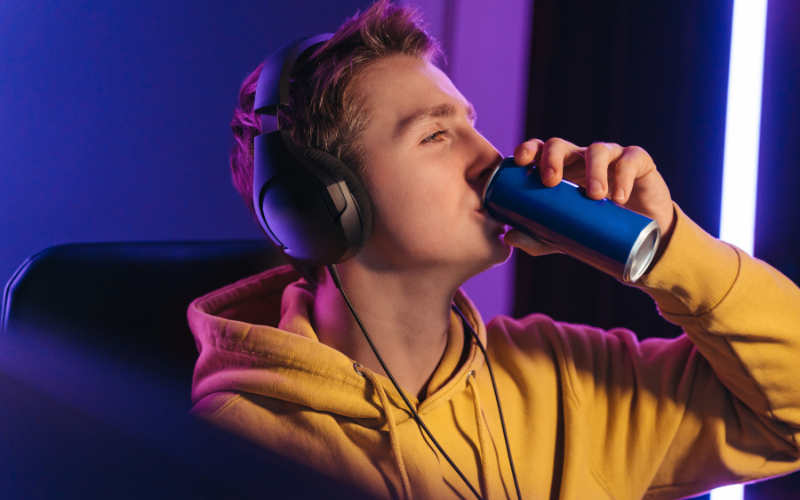Original Article | Chelsie Derman
Male college students were found to consume more energy drinks than female college students, and they had a greater risk for a short sleep duration due to energy drink consumption.

College students may consume energy drinks to stay alert, but the beverage may make people sleepier—a new study found energy drinks are linked to poor sleep quality and insomnia among college students.1,2
“Even small amounts of [energy drinks] had an impact on sleep where daily [energy drinks] consumption increased the risk of sleep problems across all parameters for both sexes,” wrote the investigators.
A study, led by Siri Kaldenbach, from the Innlandet Hospital Trust, in Lillehammer, Norway and the department of clinical medicine at the University of Oslo in Oslo, Norway, sought to investigate the frequency of energy drink consumption and the association between energy drink consumption and sleep characteristics in Norwegian college and university students. They also evaluated whether males or females consumed more energy drinks and how energy drinks affected their quality of sleep.
The investigators conducted a cross-sectional study and obtained data from the Students’ Health and Wellbeing Study 2022 (SHOT2022), a national survey. The survey, comprised of mental health and lifestyle questions, was distributed electronically between February 8 – April 19, 2022, to full-time Norwegian students. The study included 53,266 students enrolled in higher education in Norway, aged 18 – 35 years (mean age: 24 years) with 66.4% women.
The survey evaluated energy drink consumption, with the option of daily, 4-6 times a week, 2-3 times a week, 1 time per week, 1-3 times per month, and seldom/never. The survey also assessed sleep-related questions, and students reported usual bedtime and bed-rise time. The investigators evaluated sleep onset latency and wake after sleep onset.
Of the participants, 4.7% of men and 3.3% of women reported consuming energy drinks daily. Moreover, men were associated with consuming more energy drinks than women. Women (49.6%) were more likely than men (39.6%) to never or seldom consumed energy drinks.
Additionally, 5.5% of women reported consuming energy drinks 4 -6 times a week and 3.3% consumed them daily. In contrast, 7.8% of men consumed energy drinks 4-6 times a week with 4.7% consuming the drinks daily.
Kaldenbach and colleagues observed a larger frequency of energy drink consumption was linked to sleep pattern issues such as sleep onset latency and wake-after-sleep onset. The strongest association was observed between daily energy drink consumption and short sleep duration, with men (risk ratio [RR], 2.07; 95% CI 1.77 – 2.42) exhibiting a greater risk of short sleep duration than women (RR, 1.87; 95% CI 1.64 – 2.14).
Investigators called attention to an association between energy drink consumption and insomnia. Among women, insomnia was present among 51% reporting energy drink consumption compared to 33% among those who never or seldom consumed energy drinks. Among men, insomnia was present among 37% reporting energy drink consumption compared to 22% among those who never or seldom consumed energy drinks.
“Most of the associations between [energy drinks] and sleep were similar for male and female students but with a few notable exceptions,” investigators wrote. “For bedtime and risetime, we observed a significantly stronger effect for men compared with women.”
Because of the observational design, the investigators stated they could not infer causality. Moreover, the team said did not know what time the energy drink was consumed or the specific amount of the beverage—they only had access to the frequency of energy drink consumption—so that could have affected results. Another limitation, as pointed out by the team, was the “modest response rate” of 35.1% and limited information about the participants who did not complete the survey other than their age and sex.
“The results from the current study show that there is a robust association between the frequency of [energy drinks] consumption and the different sleep parameters,” investigators wrote. “Identifying modifiable risk factors for sleep problems among college and university students is vital and our results suggest that the frequency of [energy drinks] consumption could be a possible target for interventions.”
References
- Kaldenbach S, Hysing M, Strand TA, et al. Energy drink consumption and sleep parameters in college and university students: a national cross-sectional study. BMJ Open 2024;14:e072951. doi:10.1136/ bmjopen-2023-072951
- Energy Drinks Linked to Poor Sleep Quality And Insomnia Among College Students. EurekAlert! 2024. https://www.eurekalert.org/news-releases/1031709?. Accessed January 22, 2024.
